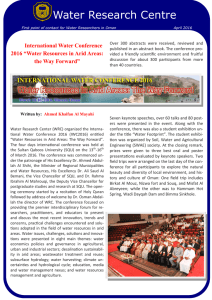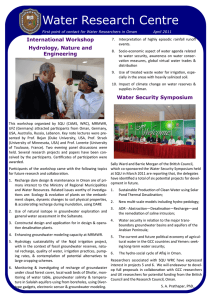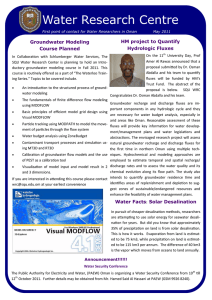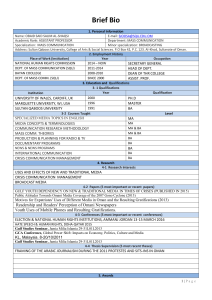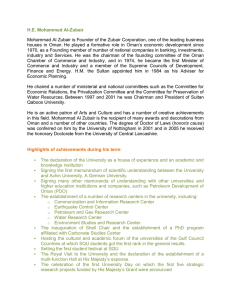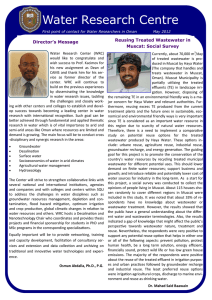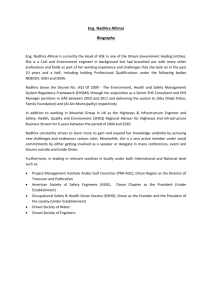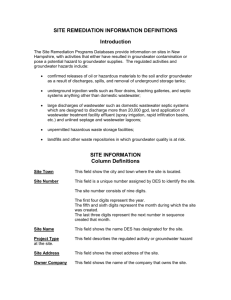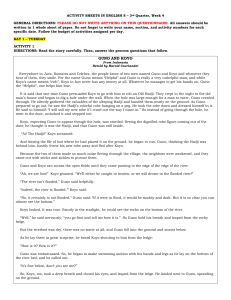Water Research Centre Director’s Message Global Warming &
advertisement
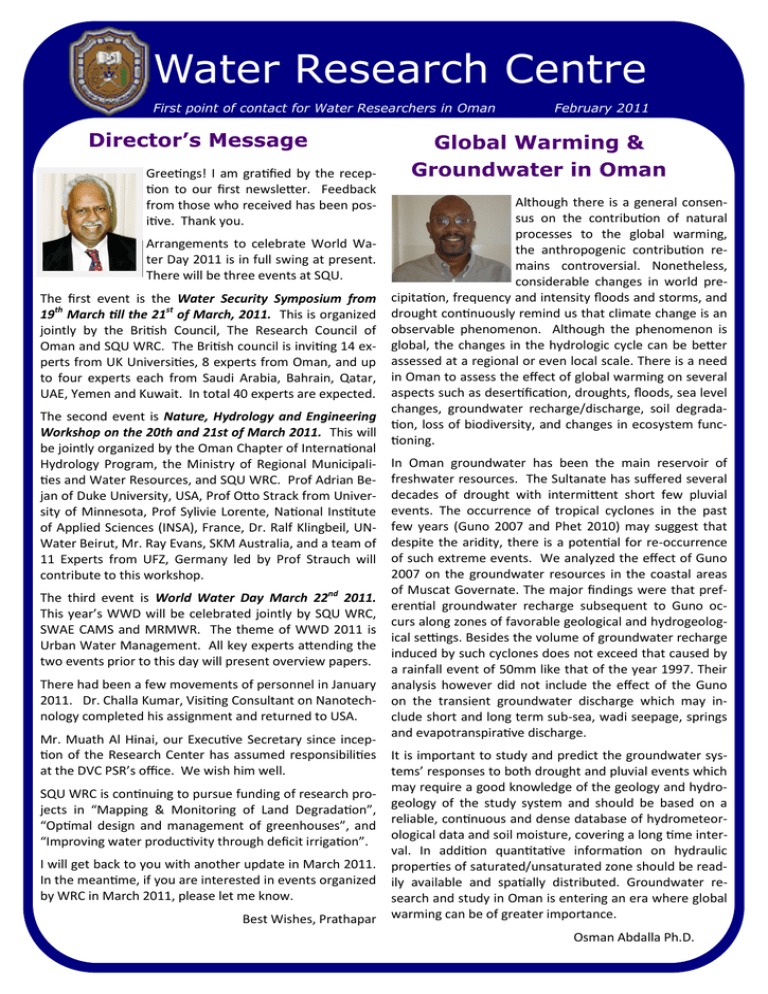
Water Research Centre First point of contact for Water Researchers in Oman Director’s Message Greetings! I am gratified by the reception to our first newsletter. Feedback from those who received has been positive. Thank you. Arrangements to celebrate World Water Day 2011 is in full swing at present. There will be three events at SQU. The first event is the Water Security Symposium from 19th March till the 21st of March, 2011. This is organized jointly by the British Council, The Research Council of Oman and SQU WRC. The British council is inviting 14 experts from UK Universities, 8 experts from Oman, and up to four experts each from Saudi Arabia, Bahrain, Qatar, UAE, Yemen and Kuwait. In total 40 experts are expected. The second event is Nature, Hydrology and Engineering Workshop on the 20th and 21st of March 2011. This will be jointly organized by the Oman Chapter of International Hydrology Program, the Ministry of Regional Municipalities and Water Resources, and SQU WRC. Prof Adrian Bejan of Duke University, USA, Prof Otto Strack from University of Minnesota, Prof Sylivie Lorente, National Institute of Applied Sciences (INSA), France, Dr. Ralf Klingbeil, UNWater Beirut, Mr. Ray Evans, SKM Australia, and a team of 11 Experts from UFZ, Germany led by Prof Strauch will contribute to this workshop. The third event is World Water Day March 22nd 2011. This year’s WWD will be celebrated jointly by SQU WRC, SWAE CAMS and MRMWR. The theme of WWD 2011 is Urban Water Management. All key experts attending the two events prior to this day will present overview papers. There had been a few movements of personnel in January 2011. Dr. Challa Kumar, Visiting Consultant on Nanotechnology completed his assignment and returned to USA. Mr. Muath Al Hinai, our Executive Secretary since inception of the Research Center has assumed responsibilities at the DVC PSR’s office. We wish him well. SQU WRC is continuing to pursue funding of research projects in “Mapping & Monitoring of Land Degradation”, “Optimal design and management of greenhouses”, and “Improving water productivity through deficit irrigation”. I will get back to you with another update in March 2011. In the meantime, if you are interested in events organized by WRC in March 2011, please let me know. Best Wishes, Prathapar February 2011 Global Warming & Groundwater in Oman Although there is a general consensus on the contribution of natural processes to the global warming, the anthropogenic contribution remains controversial. Nonetheless, considerable changes in world precipitation, frequency and intensity floods and storms, and drought continuously remind us that climate change is an observable phenomenon. Although the phenomenon is global, the changes in the hydrologic cycle can be better assessed at a regional or even local scale. There is a need in Oman to assess the effect of global warming on several aspects such as desertification, droughts, floods, sea level changes, groundwater recharge/discharge, soil degradation, loss of biodiversity, and changes in ecosystem functioning. In Oman groundwater has been the main reservoir of freshwater resources. The Sultanate has suffered several decades of drought with intermittent short few pluvial events. The occurrence of tropical cyclones in the past few years (Guno 2007 and Phet 2010) may suggest that despite the aridity, there is a potential for re-occurrence of such extreme events. We analyzed the effect of Guno 2007 on the groundwater resources in the coastal areas of Muscat Governate. The major findings were that preferential groundwater recharge subsequent to Guno occurs along zones of favorable geological and hydrogeological settings. Besides the volume of groundwater recharge induced by such cyclones does not exceed that caused by a rainfall event of 50mm like that of the year 1997. Their analysis however did not include the effect of the Guno on the transient groundwater discharge which may include short and long term sub-sea, wadi seepage, springs and evapotranspirative discharge. It is important to study and predict the groundwater systems’ responses to both drought and pluvial events which may require a good knowledge of the geology and hydrogeology of the study system and should be based on a reliable, continuous and dense database of hydrometeorological data and soil moisture, covering a long time interval. In addition quantitative information on hydraulic properties of saturated/unsaturated zone should be readily available and spatially distributed. Groundwater research and study in Oman is entering an era where global warming can be of greater importance. Osman Abdalla Ph.D. Water Research Centre (Activities, Event, Projects, Workshop & Seminars) Treatment of hospital wastewater using sorbents from modified byproducts of Omani date palm Hospital wastewater is considered an intense source of pollution despite the little attention paid to it. It contains various organic compounds, mainly pharmaceuticals, dyes and chlorinated organic compounds. In addition, it contains heavy metals, radionuclides and other chemicals. The treatment of such wastewater is required to take place prior to its mixing with municipal wastewater because many of these pollutants are persistent in the environment and they by-pass the conventional wastewater treatment methods. Adsorption as a treatment method for such pollutants was selected in this project using different adsorbents from Omani date palm leaflets and stones for the removal of some representative pollutants from hospital waste water. Dehydrated sorbents from Omani palm leaflets using chemical dehydration methods ere prepared and tested for the removal of different heavy metals such as Cr(VI), Hg(II), Pb(II) and Ag (I). However current research using that sorbent covers others heavy metals such as Cu(II) and Zn(II). The produced dehydrated sorbent is also being tested for the removal of pharmaceuticals such as paracetamol and ciprofloxacin showing promising results. Current and future work involves the preparation of activated carbon from date pits (stones) that is expected to be efficient for the removal of pharmaceuticals and other chlorinated organic pollutants in the hospital wastewater. In addition, characterization of hospital wastewater will be carried out and a dynamic sorption system using developed sorbents will be tested for its treatment. El-Said I. El-Shafey Office Address Upcoming Events!!!!!! Sultan Qaboos University March 19-21, 2011 Water Research Center Water Security in GCC P.O. Box 17 P.C. 123 March 20-21, 2011 Al– Khoud Nature, Hydrology, and Tel No.: 24143151 Engineering Email: wrc@squ.edu.om March 22, 2011 World Water Day Management of Salt-Affected Soil and Water for Sustainable Agriculture The Project " Management of SaltAffected Soil and Water for Sustainable Agriculture " was implemented by the College of Agricultural and Marine Sciences (CAMS), Sultan Qaboos University (SQU) with active participation of the Directorate General of Agricultural & Animal Research (DGALR) of the Ministry of Agriculture (MA) during the period (2006-2010). The Ministry of Regional Municipality and Water Resources and International Center for Biosaline Agriculture collaborated in the project. The project was funded by His Majesty's Trust Fund for Research at SQU. The project aimed to come up with strategies and practical recommendations to achieve principles of living with salinity through development of scientific management and field directions for farmers. Research was not only directed towards finding the best ways on how to deal with the problems of salinity and mitigation of its effects, but rather contributed to the possibility of feeding animals with forages irrigated with saline water without compromising its health or its meat quality. The project also attempted introduction of aquaculture techniques in the agricultural cycle and the use of remote sensing and geographic information systems for evaluating the degree and extent of soil salinization in the Al-Batinah Region in addition to the studies related to the economic and social aspects. Through its various stages of implementation, the project included workshops in wilayats of the Al-Batinah Region, targeted 120 farmers whose farms are affected by salinity. Five postgraduate students were able to complete their studies within the project work for Master's degree. The findings of the project are contributing to the implementation of the National Strategy for Combating Salinity and Protecting Water Resources from Pollution in the Sultanate of Oman by the Ministry of Agriculture in cooperation with the International Centre for Biosaline Agriculture. As a part of the project an international conference on the "Management of Soil and Groundwater Salinization in the Dry Regions" was hosted within the project work plan, by SQU during the period January 11 to 14, 2010. Salim Ali Al-Rawahy, Ph.D. Any suggestion or recommendation email us at wrc@squ.edu.om or call us 24143151 look for Jacquie
